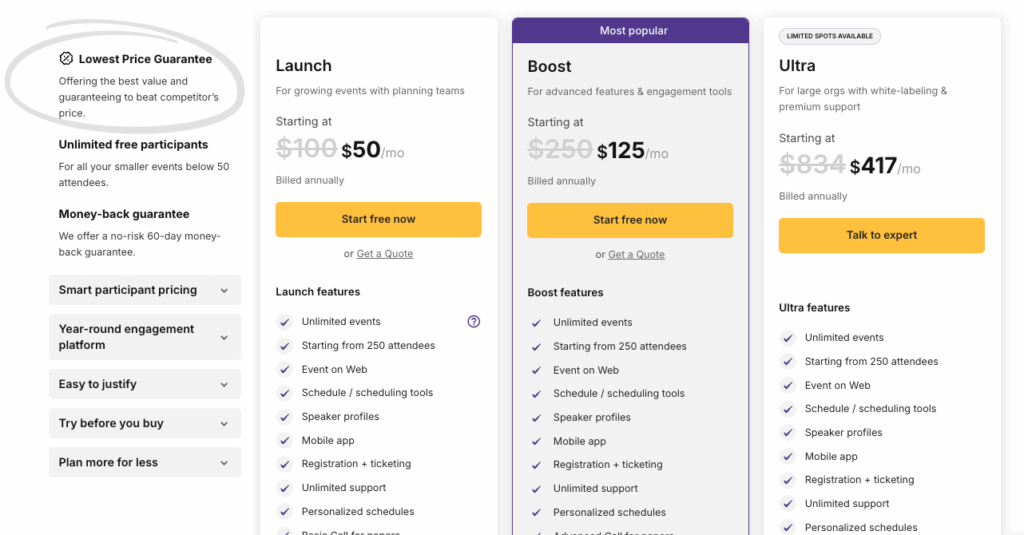Looking for a smarter, simpler alternative to Whova for your event management needs? Whova is known for its slick mobile app and attendee engagement tools, but when it comes to full-on event management, especially if you’re handling speaker submissions, complex scheduling, or multiple tracks, Sched is built for that kind of work.
Say hello to Sched, the all-in-one event management platform that helps you plan smarter, communicate better, and give your attendees a truly seamless experience. From branded mobile apps to built-in speaker proposal tools, it goes way beyond just sending invites and running polls.
Why You May Need a Whova Alternative
Table of contents
Whova is a strong platform for attendee interaction. But if your event needs more than check-ins and gamification, you might feel boxed in. Here’s where teams start looking for something more flexible:
- Cost adds up quickly: Whova charges per event and per attendee. That can get expensive fast.
- Limited scheduling tools: Managing tracks, breakout sessions, or speaker workflows isn’t its strong suit.
- No Call for Papers tool: If you’re planning a conference or festival that requires proposals, this can be a dealbreaker.
- Complex pricing: Every add-on, from virtual booths to surveys, may come with extra fees.
- Designed for engagement, not logistics: Whova shines at attendee networking, but doesn’t always support the planning side with the same strength.
Sched offers the same attendee experience with less friction, and a whole lot more power for the folks behind the scenes.
Why Sched is the Best Whova Alternative for Event Management Software
Sched was built to help event managers, educators, and nonprofit teams run better events with less stress.
Whether you’re planning a one-day academic symposium or a multi-track hybrid summit, Sched keeps your logistics tight and your audience happy.
Here’s how they compare:
| Feature | Sched | Whova |
| Pricing | Lowest-cost guarantee with discounts available; free for ≤50 attendees. | Base fee + per attendee fee. |
| Ease of Use | Clean, intuitive interface. | Great app UX; back-end can be complex. |
| Event Types | In-person, hybrid, virtual. | In-person, virtual, hybrid. |
| Scheduling Tools | Multi-track, speaker bios, personal agendas. | Basic scheduling, less suited for complex formats. |
| Mobile App | Branded, offline-capable, included. | Interactive, focused on attendee networking. |
| Call for Papers | Included for speaker submissions. | Not available. |
| Integrations | Zapier, Eventbrite, calendar sync, and many more using the Sched API. | Zoom, HubSpot, CRM tools. |
| Discounts | Nonprofits, educators, startups, switchers. | Not publicly listed. |
Sched makes it easier where Whova makes it expensive or incomplete:
- Transparent pricing, no hidden fees: With Sched, one price covers your whole event for up to 250 attendees. Whova? You’ll pay a base fee plus a fee for each attendee. Sched does the same job for less than half the price.
- No feature lockouts: Every Sched plan includes core tools like speaker management, custom agendas, and branded mobile apps. No nickel-and-diming for basic functionality.
- Built for logistics-heavy events: Sched is perfect for events with a lot of moving parts; think professional development days, academic conferences, or community festivals. If your event has tracks, sessions, speakers, and changes on the fly, Sched is the platform that can keep up.
- Speaker proposals made simple: With Sched’s built-in Call for Papers tool, you can collect, review, and manage session submissions in one place. Whova doesn’t offer a comparable feature.
- Clean setup for non-tech users: First-time planner? No problem. Sched is built to be friendly from day one, with no steep learning curve.
- Discounts for mission-driven teams: If you’re an educator, nonprofit, or switching from another tool, Sched offers special pricing to make the transition easier on your budget.
Sched is for planners who want flexibility, affordability, and tools that actually make event management easier. If you’re outgrowing Whova or just want more power without more cost, it’s time to take Sched for a spin.
Why Teams Are Switching From Whova to Sched
Sched doesn’t just cost less, it’s designed to reduce stress, streamline planning, and improve the overall event experience for both organizers and attendees.
Teams are making the switch because:
- Sched Is More Affordable and Transparent
Whova’s pricing scales up quickly with attendee count. Sched’s flat-rate per-event plans help teams stay within budget.

Explore Sched’s pricing and get started today.
- Sched Offers a Real Trial and a Money-Back Guarantee, Not Just A Demo
Sched gives you a 14-day full-featured free trial, no credit card required. Whova? You’ll need to talk to sales first.
Try Sched for free and see how easy it is to manage your event.
- Sched Is Friendlier to New Planners
With drag-and-drop scheduling, spreadsheet imports, and quick customization, Sched helps first-time users feel like pros.
- Sched Includes Powerful Tools Whova Doesn’t
Tools like Call for Papers, branded offline-capable apps, and speaker bios make Sched ideal for conferences and academic events.
- Sched Works at Any Scale
Whether you’re hosting a small workshop or a 5,000-person summit, Sched scales with you. Whova doesn’t seem to be a cost-effective alternative for smaller teams.
Sched is a Great Event Management Solution for Any Industry
Sched may be loved by schools and nonprofits, but it’s just as effective for businesses, government, and associations:
- Education: Manage PD days, symposiums, and academic conferences with ease.
- Nonprofits: Run training, donor summits, or volunteer events without blowing your budget.
- Corporate: Host internal offsites or public conferences with full branding and customization.
- Government: Offer accessible, well-organized civic events and community outreach sessions.
- Associations: Schedule complex annual meetings, regional meetups, or policy events effortlessly.
No matter your size or sector, Sched keeps your events organized, accessible, and successful.
Here’s why it’s so versatile:
- Fits your budget: Free for small events, just $199/year for unlimited use. No surprises.
- Grows with your goals: Small training one day, large conference the next? Sched adapts with you.
- Packed with useful tools: From session freezing to branded apps and speaker management, Sched stays ahead of what planners need.
- Easy for anyone to use: Whether you’re a first-time organizer or a seasoned pro, you’ll find the learning curve refreshingly short.
If Whova’s price tag, complexity, or virtual-first focus is making you second-guess your platform, it might be time to explore what Sched can do. It’s built to help you plan smarter, not harder.Ready to test it out? Try Sched risk-free with a free trial and 60-day money-back guarantee, and see for yourself why it’s the Whova alternative you’ve been waiting for.
Related Topics:
- Sched vs EventMobi
- Sched vs Airmeet
- Sched vs Bizzabo
- Sched vs Cvent
- Sched vs Hopin
- Sched vs Hubilo
- Sched vs RSVPify
- Sched vs vFairs
- Sched vs Webex
- Sched vs Whova
Frequently Asked Questions (FAQs)
1. Can Sched handle large events?
Absolutely! Sched is designed to scale with your needs, whether you’re running a small workshop or a multi day conference with thousands of attendees.
2. Does Sched offer a free trial?
Yes. A full-featured, no-credit-card-needed 14-day trial.
3. What makes Sched different from other event management platforms?
Sched focuses on ease of use, affordability, and stress-free setup, while still delivering the features you need.
4. Does Sched integrate with other platforms?
Yes! Sched integrates with calendar apps, ticketing systems, and other event tools to keep your workflow smooth. Start a free trial and ask about our API.
5. Who can get a discount on Sched?
Sched offers exclusive discounts for schools, nonprofits, startups, government agencies, and event organizers who host multiple events or sign multi-year agreements.
6. What is the starting price of Sched?
Plans start at just $50/mo with discounts available. Compare pricing and get started today.








